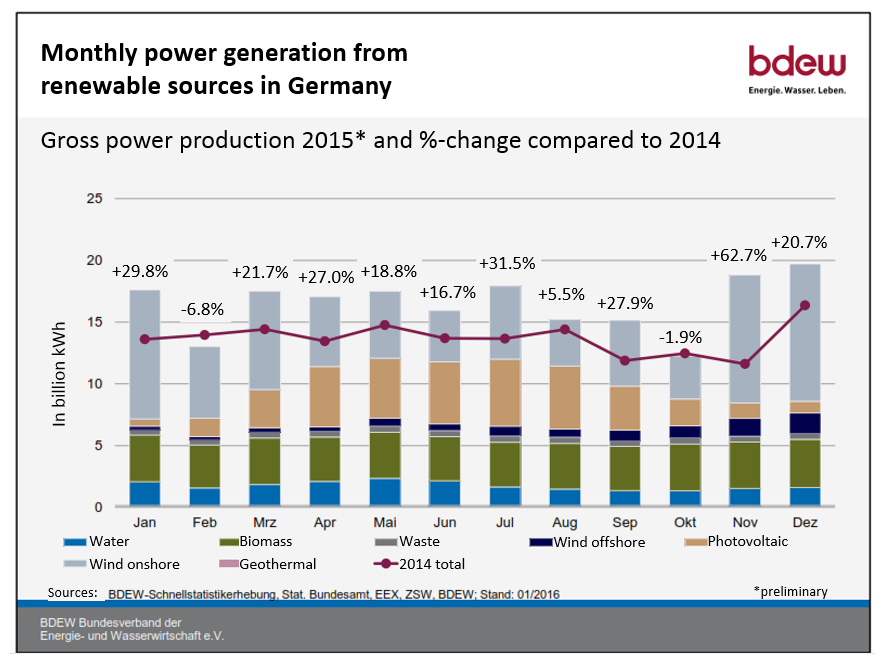'Basement energy transition cancelled' / What future for wind gas?
Die Welt
“Energy transition in the basement cancelled”
Three quarters of the energy consumption of German households is used for heating and hot water, writes Daniel Wetzel in Die Welt. Climate protection should therefore start with the boilers in the basement but the 2015 figures of the heating industry show that renewables are used less in this area. The sale of oil heatings has picked up – but the new models are almost as efficient as gas-powered boilers, the article says. Uncertainty about future heating regulation undermined the interest in heat pumps and combined heat and power technologies, according to the article.
Read the article in German here.
Greenpeace Energy
“Wind gas makes energy transition secure and inexpensive”
Germany will need at least 14 gigawatt of wind gas electrolysis capacity by 2040, a study by Energy Brainpool on behalf of power provider Greenpeace Energy has found. The technology would contribute to a secure power supply with a high share of renewable energies as it converts excess green power into renewable gas. This can then be stored for long periods of time in the natural gas grid. The study describes a development path for the wind gas electrolysis.
Download the study in German here.
Handelsblatt
“Climate action has to be economically sensible”
Greenpeace’s warning that Germany will have to cut CO2 emissions faster and shift to an economy powered by renewables by 2035 will face resistance from businesses, Silke Kersting writes in the Handelsblatt. German industry already considers itself to be “bossed around” compared to international competitors, Kersting says. Tougher rules for the transport and building sector that would be necessary to improve greenhouse gas reductions are likely to trigger even more resistance.
Read the article in German here.
Die Welt
“German oil industry blames government for crisis”
The German oil and gas production business has officially announced a crisis, writes Daniel Wetzel in Die Welt. Germany is covering less and less of its domestic consumption from its own sources after years of declining production and many lost jobs. The sector blames German politics rather than the international decline of oil and gas prices, writes Wetzel. There have been almost no new drilling permissions since 2011 because the fracking technique has been all but banned, Gernot Kalkhoffen, head of ExxonMobil Germany, told the author.
Read the article in German here.
taz – die Tageszeitung
“Too late for a good solution”
The suggestions for a nuclear fund which power station owners will pay 18 billion euros into to potentially cover the costs of storing Germany’s nuclear waste do not sound fair, writes Malte Kreutzfeldt in an opinion piece for the taz. It looks as though the large utilities - which for decades earned billions through nuclear power - get to transfer the financial risk of the nuclear clean-up to the state. Unfortunately, the solution suggested by environmentalists and the opposition – an eternal liability for the polluters – is not practicable either.
BDEW
Energy transition info 2016
The German association of Energy and Water industries has released a new data compilation on renewable energies and the Renewable Energy Act. It contains figures and graphs on renewables development, power production, distribution and costs from 2014 and 2015.
Download the information in German here.
Institute for Applied Ecology
“The current electricity costs of energy-intensive industries in Germany”
A January 2016 analysis by Felix Matthes, researcher at the Institute for Applied Ecology, shows the status of cost and prices relevant to large industrial power consumers. A comparison of electricity prices for industrial consumers in Europe shows that German companies do not pay the highest price in Europe. But they are in the “upper echelons” as only businesses in the UK and Italy pay more. However, if comparing the greatly changing price trends over several years, Germany was “clearly in the medium range” of European countries, the author says.
Read the analysis in English here.
Read a CLEW dossier on cost, prices and competitiveness of the German economy in the Energiewende here.
Federal Environment Agency (UBA)
Ways for an efficient integration of renewables into the power market
The Federal Environment Agency (UBA) has published two studies showing that an optimised energy-only market can cope best with the increasing amount of renewables. The studies conclude that a capacity market in which power station operators are paid for having electric capacity on stand-by would make the integration of renewables into the market more difficult and would lead to additional costs. The studies therefore confirm the path for a reformed energy-only market as chosen by the government, an UBA press release says. The two studies, entitled “power market design of the future” and “power market and climate protection”, were conducted by r2b energy consulting.
Download the studies in German here.
Fraunhofer ISE
“Concentrator Photovoltaic Technology Continues to Break New Records”
German research institute Fraunhofer ISE has achieved a new efficiency world record with its concentrator photovoltaics system. The mini-module reached 43.4 percent efficiency.
Read the press release in English here.

